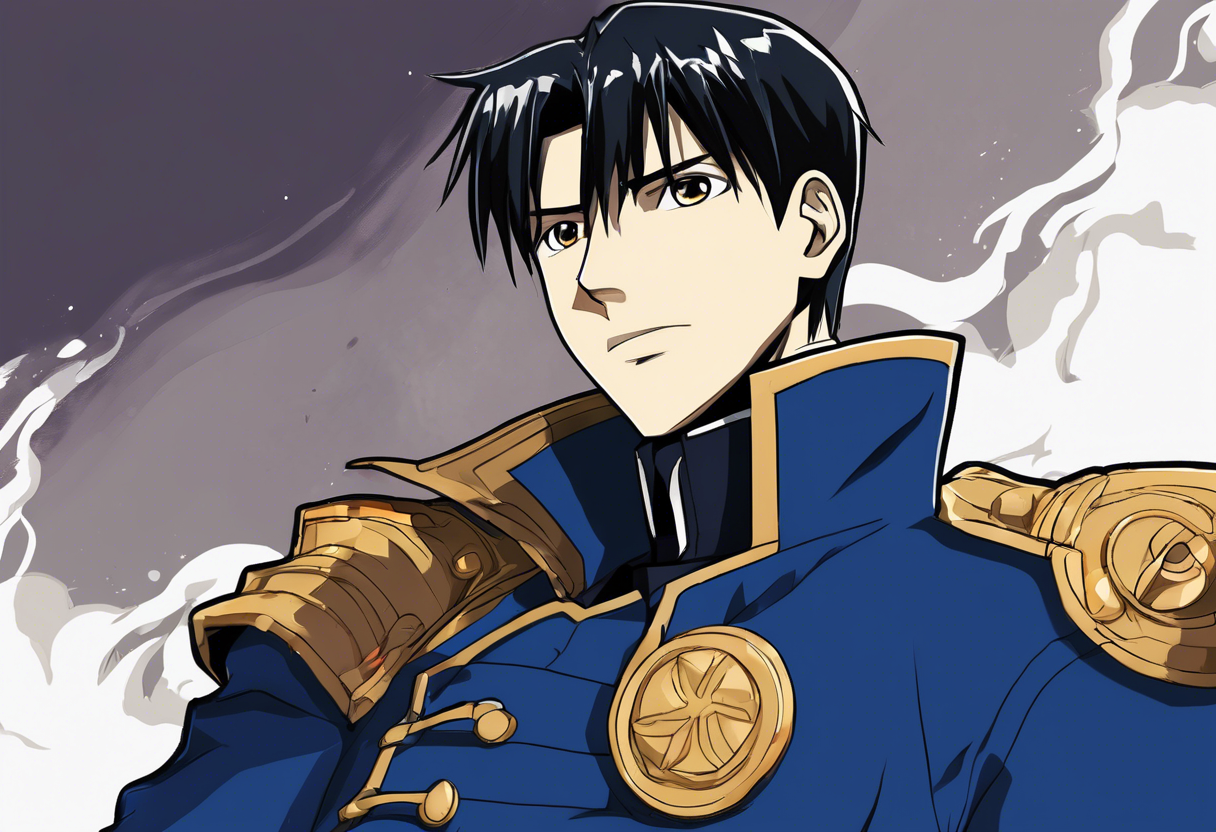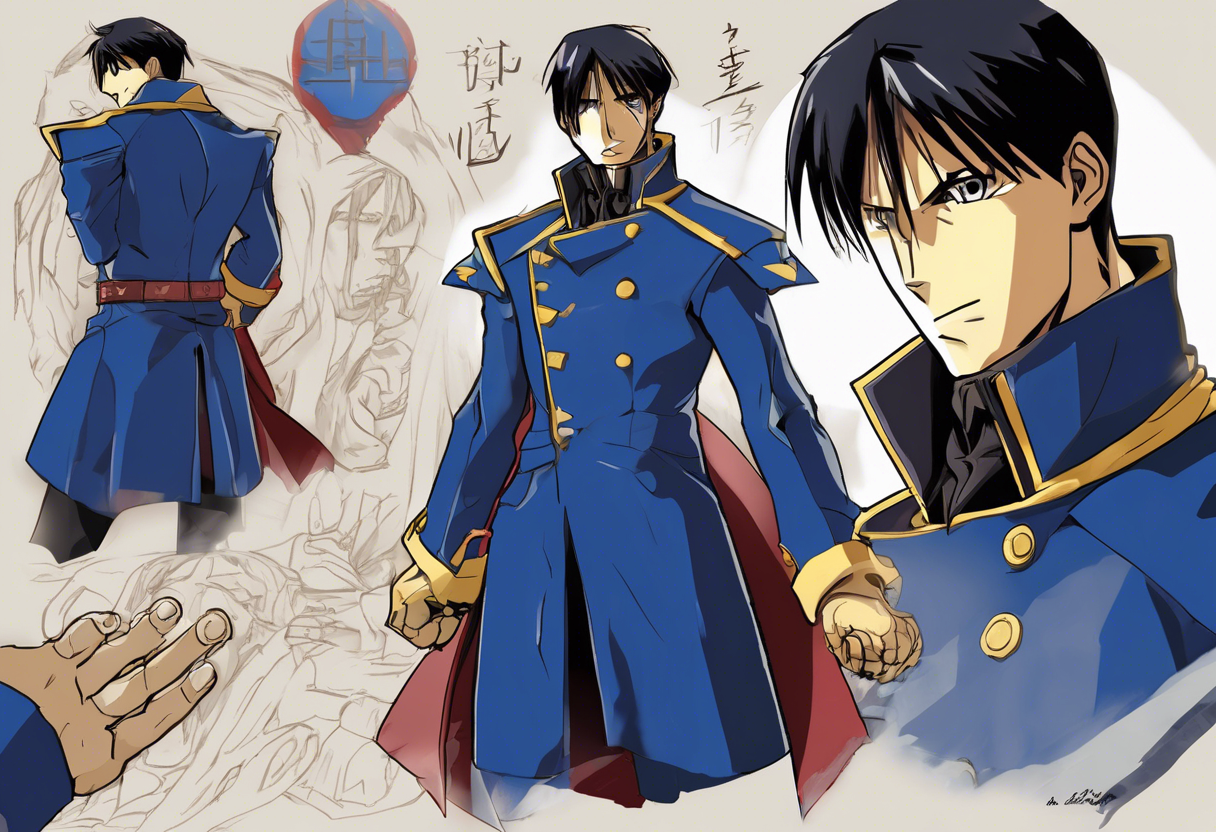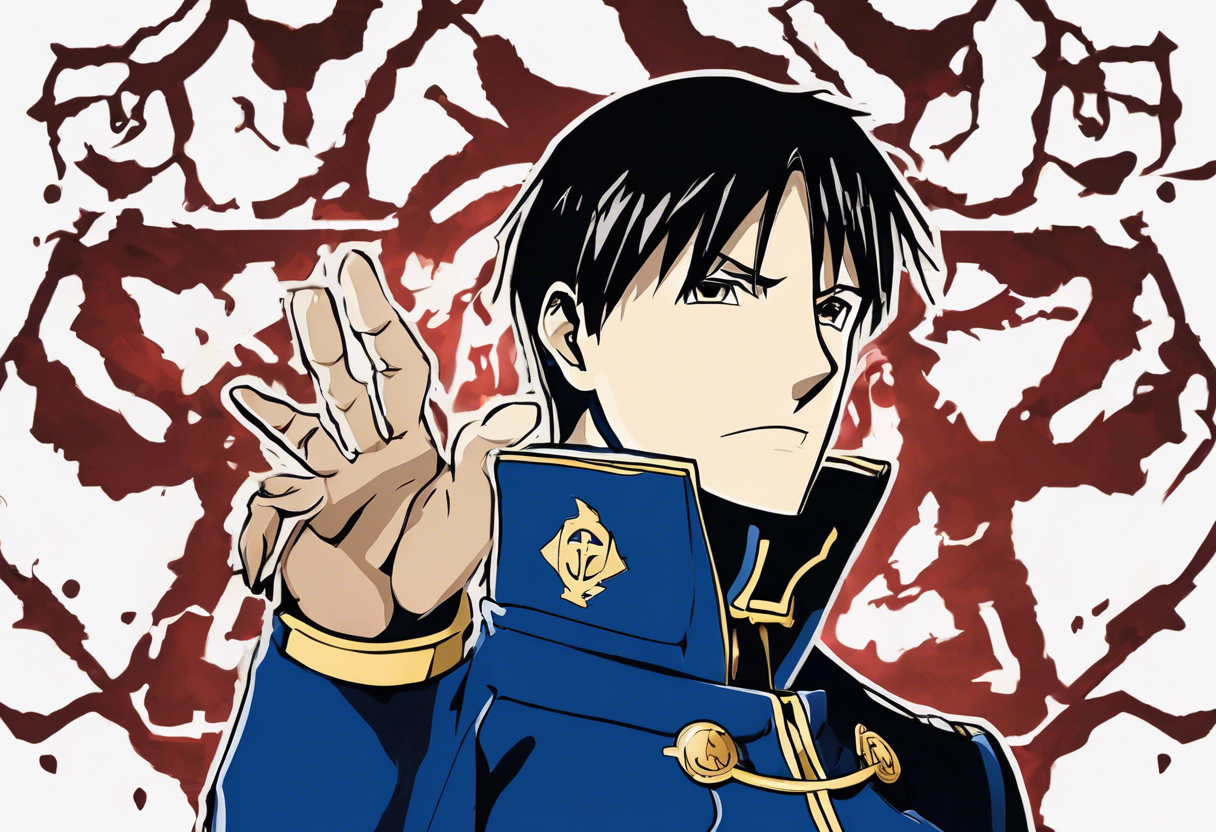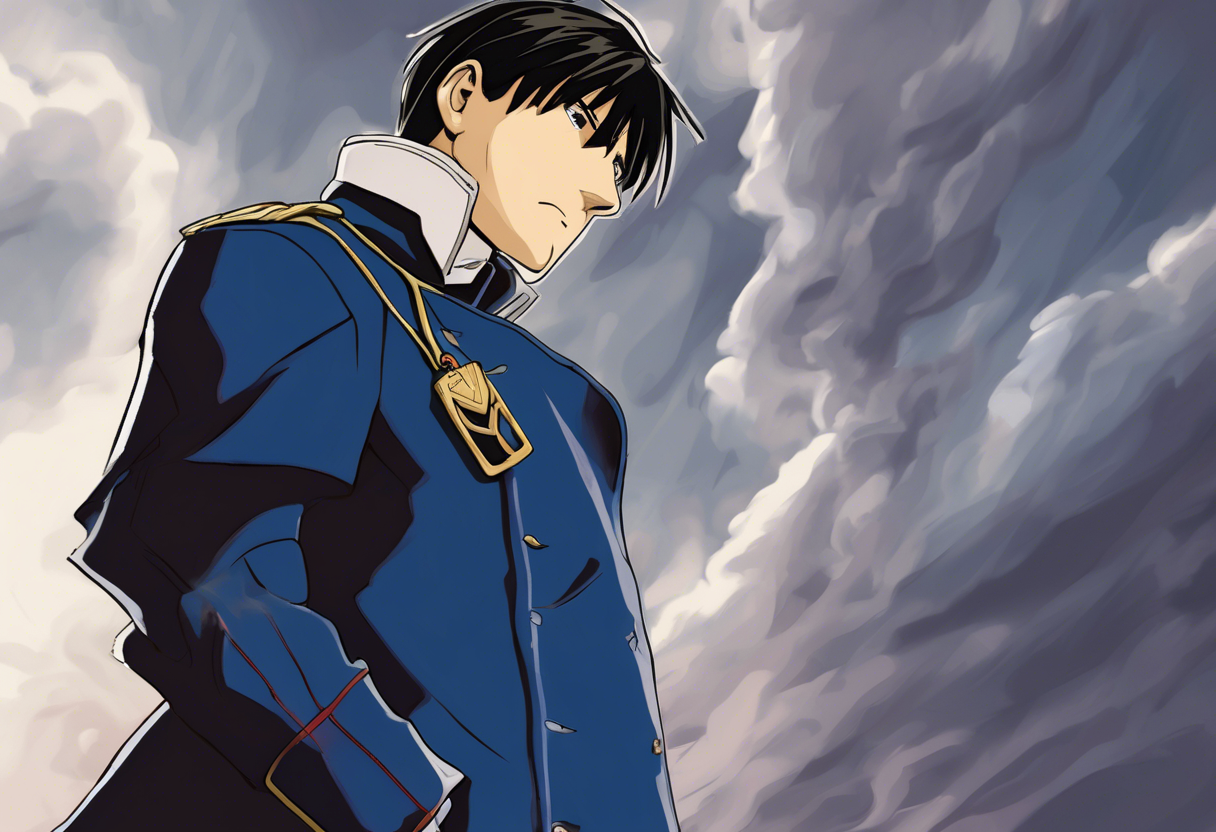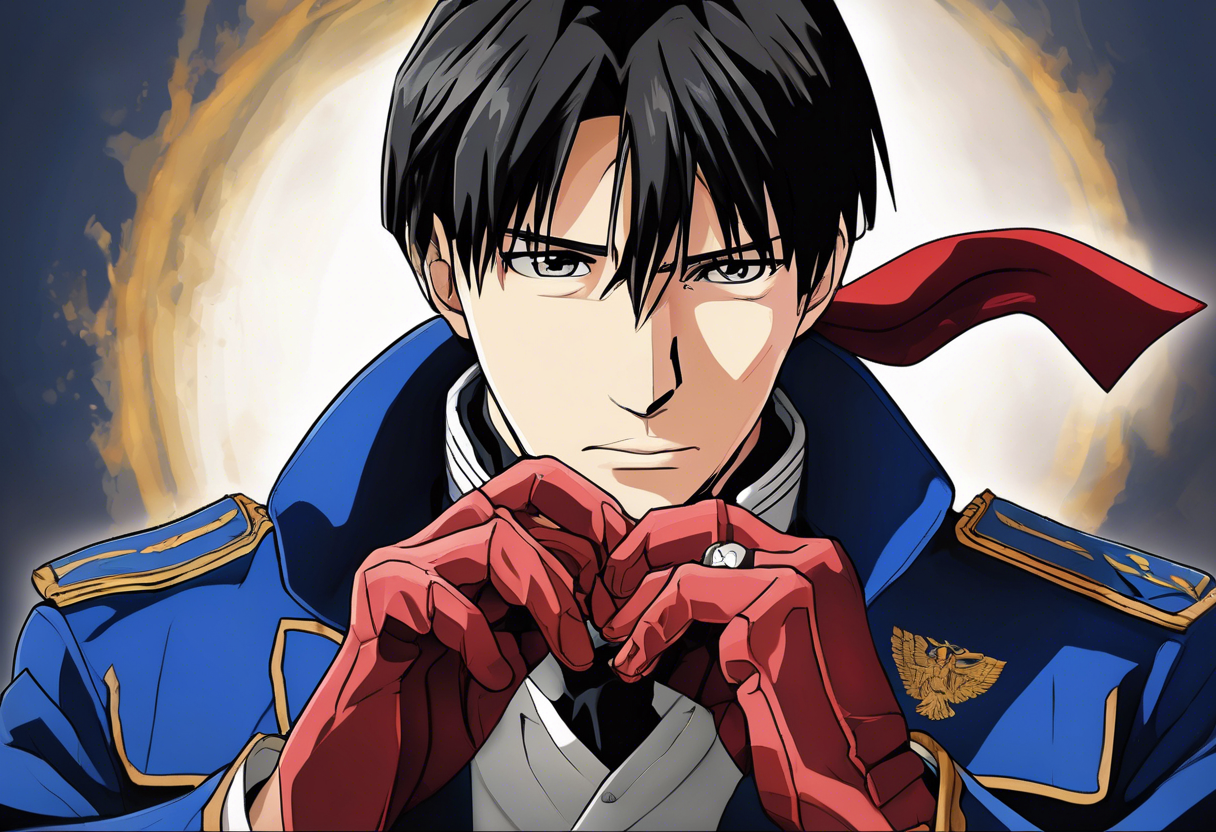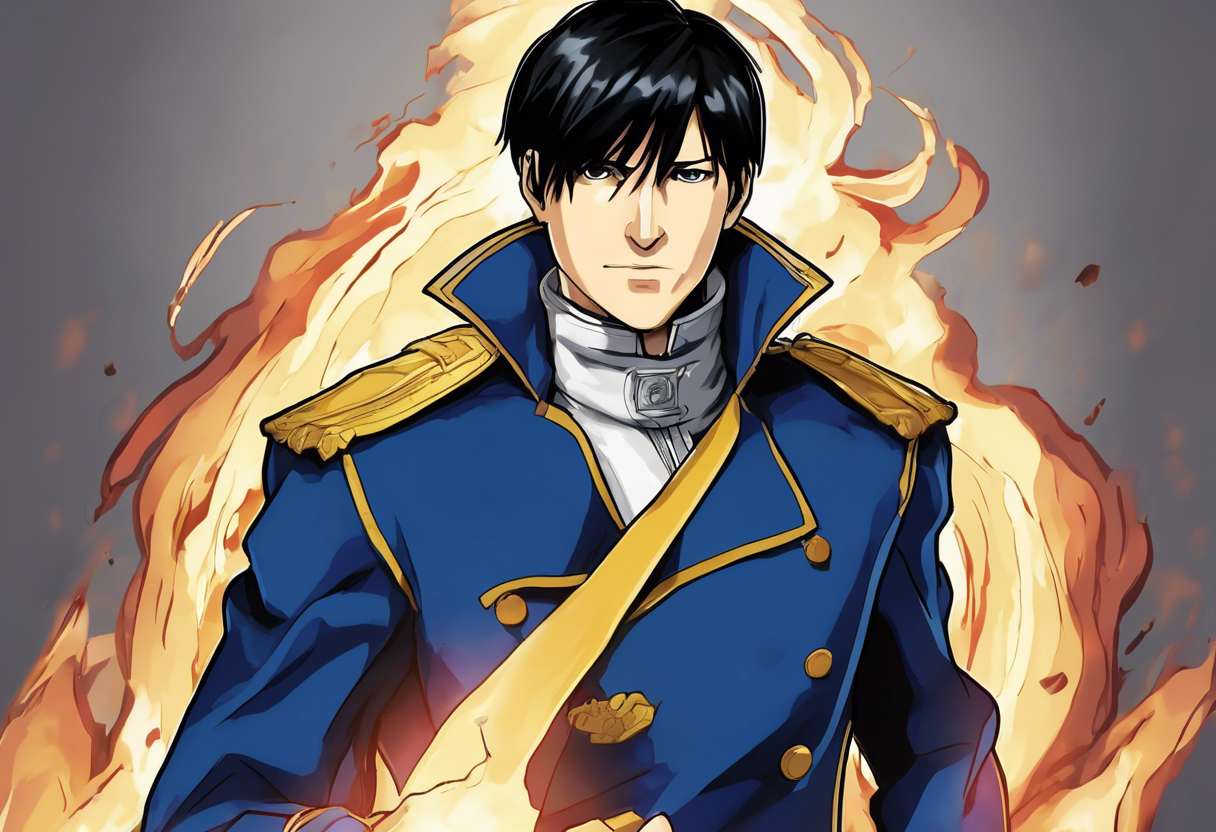Contents
Introduction
Roy Mustang, also known as the "Flame Alchemist," is a pivotal character in the anime series Fullmetal Alchemist: Brotherhood, created by Hiromu Arakawa. Introduced in the manga series and subsequently adapted into various anime iterations, Mustang is a State Alchemist and a high-ranking officer in the Amestrian State Military. His character is defined by his complex backstory, his unique alchemical abilities, and his ambitious yet morally conflicted personality.
Mustang’s creation is a testament to Arakawa’s skill in crafting multidimensional characters. He first appears in the manga series as a 29-year-old State Alchemist and the superior of the protagonist, Edward Elric [3][5]. His defining traits include his ability to create and manipulate fire using special gloves with transmutation circles, earning him the title "Flame Alchemist" [3][5].
Role in the Narrative
Roy Mustang plays a crucial role in the narrative of Fullmetal Alchemist: Brotherhood. He is not only a superior officer to Edward Elric but also a key figure in the military and political landscape of Amestris. His journey is intertwined with the main storyline, as he navigates the complexities of military life, personal guilt, and the pursuit of power.
Role in the Story
Mustang’s storyline in Fullmetal Alchemist: Brotherhood is marked by several significant events and relationships. Initially, he is portrayed as an outwardly arrogant and playfully manipulative character, known for his womanizing and career ambition. However, as the series progresses, his deeper character is revealed, showing a man haunted by the atrocities he committed during the Ishval Civil War [1][3].
The Ishval Civil War
Mustang’s past is deeply scarred by his involvement in the Ishval Civil War. He was part of the State Alchemists who were called in to end the war, during which he executed orders that led to the deaths of many innocent people, including doctors who were helping both sides. This experience left him with profound guilt and a sense of self-loathing [1][3].
Relationship with Edward Elric
Mustang’s relationship with Edward Elric is multifaceted. He is Edward’s superior officer and uses Edward’s abilities to further his own goals within the military. However, he also shows a paternal care for Edward and his brother Alphonse, particularly as the series progresses and he becomes more involved in their quest to restore their bodies [1][3].
The Quest for Power and Reform
Mustang’s ultimate goal is to become the Führer of Amestris, not for personal glory, but to reform the military and the government from within. He aims to prevent future atrocities like those of the Ishval War and to ensure that he will never have to follow unjust orders again [1][5]. This ambition is driven by his friendship with Maes Hughes, who encourages him to seek this position to bring about positive change.
Key Events and Conflicts
Throughout the series, Mustang is involved in several key events. He investigates the murder of his best friend, Maes Hughes, and later becomes a crucial figure in the battle against the Homunculi, who are controlling the State Military. His actions often put him at odds with the higher-ups in the military, but he remains committed to his goal of reforming the system [3][5].
Character Analysis
Roy Mustang’s character is a rich tapestry of personality, motivations, strengths, and flaws.
Personality
Mustang is intelligent, adaptable, and charismatic. He has a playful and manipulative side, often using his charm to achieve his goals. However, beneath this facade lies a deeply troubled individual haunted by his past actions. He is driven by a strong sense of duty and a desire to make amends for his sins [1][3][5].
Motivations
Mustang’s primary motivation is to become the Führer to reform the military and government. This goal is rooted in his guilt over the Ishval War and his desire to prevent similar tragedies. He is also motivated by his loyalty to his friends and subordinates, particularly Maes Hughes and Riza Hawkeye [1][3][5].
Strengths
One of Mustang’s greatest strengths is his alchemical ability, which allows him precise control over fire. He is also a skilled commander and strategist, earning the loyalty of his subordinates. His charisma and intelligence make him a formidable figure in both military and social settings [3][5].
Flaws
Mustang’s flaws include his self-loathing and the emotional baggage he carries from the Ishval War. He struggles with alcoholism and has considered suicide as a way to escape his guilt. His ambition can sometimes make him appear power-hungry to those who do not know him well [1][3].
Development
Throughout the series, Mustang undergoes significant character development. He begins to confront his past and the true nature of the military he serves. His relationships with other characters, particularly Edward and Riza, help him to find a new sense of purpose and redemption. By the end of the series, he has transformed from a self-centered careerist into a leader who genuinely cares about the welfare of his country and its people [1][3][5].
Themes and Symbolism
Roy Mustang embodies several key themes in Fullmetal Alchemist: Brotherhood.
Guilt and Redemption
Mustang’s character arc is a powerful exploration of guilt and redemption. His actions in the Ishval War and his subsequent struggle to make amends serve as a reminder that past mistakes can be redeemed through future actions. This theme is central to the series, highlighting the importance of accountability and personal growth [1][3].
Power and Corruption
Mustang’s ambition to become the Führer raises questions about the nature of power and corruption. His journey shows that power can be used for good or evil, depending on the intentions of the individual wielding it. This theme is underscored by the contrast between Mustang’s goals and the corrupt actions of the Homunculi and other high-ranking military officials [3][5].
Loyalty and Friendship
The bonds of loyalty and friendship are crucial to Mustang’s character. His relationships with Maes Hughes, Riza Hawkeye, and the Elric brothers illustrate the importance of these connections in overcoming personal and societal challenges. These relationships also highlight the human cost of war and the importance of empathy and compassion [1][3][5].
Cultural Impact
Roy Mustang has had a significant cultural impact since his introduction in the manga and anime series.
Fan Reception
Mustang is widely admired by fans for his complexity and depth. He has consistently ranked high in popularity polls for the series, often second only to the main protagonists, Edward and Alphonse Elric [3].
Adaptations and Spin-Offs
Mustang has appeared in various adaptations and spin-offs of the series, including light novels, original video animations, and video games. His character has been well-received in these different media, further solidifying his place in the cultural landscape of anime and manga [3].
Influence on Popular Culture
Mustang’s influence can be seen in other works of anime and manga, where characters with similar complexities and moral ambiguities have been created. His character archetype—the flawed but redeemable hero—has become a staple in many contemporary anime series [3].
Critical Reception
Roy Mustang has received widespread critical acclaim for his character development and role in the narrative.
Praise
Critics have praised Mustang’s character for its depth and complexity. His journey from a self-centered careerist to a leader driven by a desire for reform is seen as one of the most compelling aspects of the series. His relationships with other characters and his moral struggles have been particularly highlighted as strengths of the character [1][3].
Controversies
Some critics have noted that Mustang’s character in the 2003 anime series differs significantly from his portrayal in Brotherhood and the manga. In the 2003 series, he is depicted as more broken and consumed by revenge, which some argue detracts from the more heroic and nuanced portrayal seen in Brotherhood [1].
Varying Interpretations
Audiences and critics have interpreted Mustang’s character in various ways. Some see him as a symbol of redemption and the possibility of change, while others view him as a commentary on the dangers of ambition and the corrupting influence of power. These varying interpretations underscore the complexity and richness of his character [1][3][5].
Legacy
Roy Mustang’s legacy in the world of anime and manga is profound.
Enduring Appeal
Mustang’s enduring appeal lies in his relatability and complexity. His struggles with guilt, ambition, and redemption make him a character with whom audiences can empathize. His development throughout the series serves as a powerful reminder of the human capacity for change and growth [1][3][5].
Relevance in Contemporary Discussions
Mustang’s character remains relevant in contemporary discussions about power, morality, and personal responsibility. His story serves as a cautionary tale about the consequences of unchecked ambition and the importance of accountability. These themes continue to resonate with audiences today, making him a timeless character in the world of anime and manga [1][3].
Inspiration for Other Works
Mustang has inspired other character archetypes in anime and manga. His blend of charisma, intelligence, and moral complexity has influenced the creation of characters in various series, ensuring his legacy extends beyond the Fullmetal Alchemist franchise [3].

